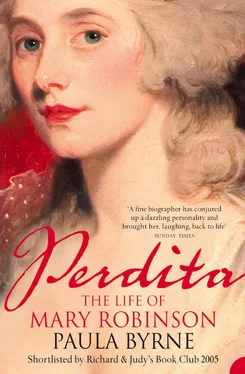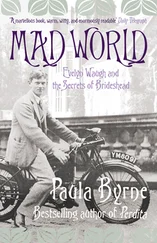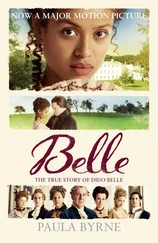1 ...8 9 10 12 13 14 ...31 That phrase ‘one or two letters’ is, however, economical with the truth. To a greater extent than at any other point in the Memoirs , Mary was whitewashing her own past. The real story of her involvement with ‘Jew’ King reveals that she was by no means the naive newlywed she would have her readers believe in.
At the height of her fame, Mary was notorious not only for the love letters sent to her from the Prince of Wales under the signature ‘Florizel’, but also for a much sleazier correspondence with King. In 1781, as part of a concerted press campaign to blacken her name, there appeared a slim quarto volume, published at two shillings, which purported to contain copies of real letters that passed between Mrs Robinson and a ‘certain Israelite’ between 21 September and 30 November 1773. Her letters were all dated from Bristol and addressed to King in London. In one of them, dated 9 November, she says that on the previous Tuesday Mr Robinson had set out for Carmarthenshire, where he intended to stay a week, and that he would then send for her to join him. The circumstances fit precisely with the account in the Memoirs of how Mary waited at Bristol with her mother while Robinson went forward to pave the way for her reception in Wales. Many details in the published letters are so specific that it is impossible to suppose that the volume was merely a malicious fabrication. What is more, as will be seen in a later chapter, Mary and her then lover, Lord Malden, made strenuous efforts to recover the original letters. This attempt strongly suggests that in reality more than ‘one or two letters’ passed between Mary Robinson and John King in the first year of her marriage. Though in all probability King spiced up the text for the purposes of publication, Letters from Perdita to a Certain Israelite, and his Answers to them gives us the very voice of the young Mary with an immediacy that is altogether lacking in the carefully self-censored retrospective narrative of the Memoirs . 9
The letters reveal an intimacy that would never have been guessed from the casual passing reference to King in the Memoirs . The first of them reads as follows:
Bristol, 21st Sept. 1773
Sir,
I never deemed myself happier, than I found myself those few Days you accompanied us upon the Road; indeed your Company, from the first Moment of our Acquaintance, has been so agreeable, that I scarcely know how to spare you. Shall we expect you at Bristol ? Write me soon; write the Style you know I like; let it be plaintive; sooth the Wanderings of my pensive Breast.
Your humble Servant , M. R—
Just as the Robinsons were accompanied at the beginning of their honeymoon not only by Hester Darby but also by Hanway Balack, so they set off for Bristol with King as well as Mary’s mother. The information that Mary has found King’s company highly agreeable ever since their first acquaintance reveals that she must have spent considerable time in his company in the five months since her marriage. What is more, the preface explaining the circumstances of the correspondence includes the information that – on the basis of Thomas Robinson’s prospects of inheriting an estate – King had already lent the couple a substantial sum of money.
The extent of their involvement is further exposed in Mary’s second letter, in which we discover that King was with the Robinsons when they stopped for their sightseeing in Oxford:
Bristol, 29th Sept. 1773
With Pleasure I take this Opportunity of answering my worthy Friend’s obliging Epistle. R—is not yet gone to Wales , but as he will go soon, it makes me uneasy; you know how I love him , therefore will excuse my mentioning him. The Weather is extremely fine, and nothing but your Company is wanted to enliven the Place. We hope by this Time you have seen dear little George, and that he is well. You cannot conceive with what Regret we parted with you at Oxford ; the Three last Days were not spent half so agreeable as the first. I am quite ashamed of this intolerable Scroll, but I hope you will pardon it, for I am fatigued almost to Death. Mrs Darby begs her respects.
Your Friend .
King, then, not only travelled with Thomas, Mary, and Hester as far as Oxford: he was also asked to keep an eye on George, Mary’s younger brother left behind in London. King’s response to this letter was flirtatious and literary. Mary wrote again a week later. She, too, flirts in one sentence and moralizes in the next. She was missing him and missing the buzz of London still more:
I wish you were sincere in what you say, I do not think you are, but still I believe myself happy in your good Opinion; you treat me so much in a Style of Compliment, that I really do not know in what Manner to return it; you express so much Friendship, that the hardest Task, I ever undertook in my whole Life, is how to return Thanks suitable to the Favours I have received from you … I long to be in Town. Do not forget our intended Party to Drury-Lane Theatre; you know I am passionately fond of Plays, and I was going to say, I envy you, but Envy I detest.
But then she comes to the main point:
not that I think Generosity consists in throwing Money away at Random, without Distinction or Judgment, but in bestowing it in proportion to the Merit and Condition of those who stand in need of our Assistance. I agree with my favourite Author, who says, in Trust, Intimacy and Confidence, be as particular as you can; in Humanity, Charity and Benevolence, universal. I shall depend on your Promise this Week for I am really distressed.
A plea for funds is dressed up as a moral duty and spiced with literary allusion. King’s response begins in a similar high-minded tone: ‘Morality is that great fundamental Tie that forms and preserves the Peace and Welfare of Society.’ But it quickly turns to an admonition that Mary’s ‘immoderate’ desire for material wellbeing is in danger of leading her to ‘Indiscretion’ and exposing her to ‘the destructive Stratagems of some libidinous Profligate’. Having warned her against the seductions of fashionable society, King then lets his own emotions speak:
That fair youthful Frame is such an Invitation to Love, as no moral or platonic Tenets can restrain. How I pant to be at Bristol , to accompany you through the verdant Meads to the Side of some Silver Stream, slow wandering its Meanders down the Glade, or to the cool Recess of a shady Grove, where every Gale whispers Pleasure, Contentment and Love! Your Breath will add new Fragrance to the Amaranth; the Rose will receive a deeper Hue from the Reflection of those florid Tincts that adorn thy blooming Cheeks, while you melt my Soul to all the soft Attainments of Love.
The expression of such sentiments was King’s price for the payoff signalled by the end of the letter: ‘ Adieu! Be ever happy as you are good . Inclosed £50.’
The next letter purportedly from Mary would severely damage her reputation when King published the correspondence eight years later:
I wish you would not write, for while you endeavour to inculcate such good Doctrine, you know I am charmed by your Letters to a Sin. How call I love that stupid Thing R—! yet I am his, Fortune has made it so; but I cannot think I am bound to abide strictly by an Engagement that I was trepanned into, for you know he deceived me. Shall I ever write as well as you do? I am fond of Poetry, and you shall correct some Attempts in that Way, when I come to London . My Friend, you know I esteem you: is it a Crime to say I love you? I feel an Inclination to love Somebody; and how can I love him who is too stupid to return it? Why then, I will love you. Write again, write every Evening, or I shall be melancholy.
Читать дальше












